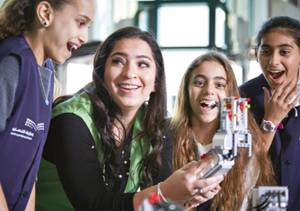Sponsored Content: How can more women drive innovation in our industry?
According to the international Energy Agency (IEA), women only account for around 22% of the workforce in the oil and gas industry*. Progress has been made in recent years, but there is still much work to be done, and Aramco is committed to remaining an innovative and inclusive place to work for diverse talent.
Paving the way
Nearly 60 years ago, Najat al-Husseini became the first Saudi woman to work as a scientist at Aramco. She used her education and skills in preventative medicine to provide vital vaccinations against diseases like smallpox and malaria for children in neighboring communities, helping to eradicate these diseases.
Fast forward to today, more female engineers and scientists than ever before are carrying Najat's torch. These scientists’ work includes advancing ground-breaking technologies including storing CO2 in cement, identifying new opportunities for non-metallics, and directly converting crude oil to chemicals at our Research & Development Center (R&DC).
Categorizing vital materials in extraordinary detail
One of these trailblazers is Dr. Anaam Al-ShaikhAli, who joined the R&DC in 2006. Since then our number of female lab scientists has grown exponentially, and Dr Al-ShaikhAli’s work in the Advanced Analysis Unit of our Technical Services Division is helping to increase our understanding of why different materials show different properties and behaviors.
Through advanced and complementary characterization techniques, including microscopies, spectroscopies and thermal analysis, her team is able to probe and map the surface and sub-surface structure of any soil material to gather information about its structure in nanoscale. This enables them to develop innovative solutions to solve complex challenges related to oil and gas applications.
Exploring the future of lower emission energy
More cutting-edge research is being done by Esra M. Alhabshi, as part of our Sustainable Energy Team. Working in collaboration with the King Abdullah University of Science and Technology (KAUST), her team is exploring the use of non-metallics to improve the efficiency of solar cells. The potential impact of their work is enormous, allowing us to convert more of the sun’s energy into sustainable and reliable energy.
"Fifty years from now, the production of new materials, layered with silicon, could increase the possibility that we take much more energy from the sun. Materials like perovskite, which are light and flexible, have a lot of potential for use in solar cells, said Esra M. Alhabshi, Sustainable Energy Team.
Discovering and uncovering new talent
Discovering and nurturing the next generation of engineers and scientists is a critical part of what we do, and we take it seriously. We have invested in educational programs to support young Saudis studying at academies and universities – both locally and abroad – over the last several decades. This includes our Advanced Degree Program, which began in the 1980s and helps employees get their Master’s degrees in key STEM subjects.
Every year, we sponsor a new cohort of talented Saudi high school graduates to study for a Bachelor’s degree abroad through our College Degree Program for Non-Employees (CDPNE). This involves a comprehensive 10-month course to help them prepare for the challenges of enrolling at a top-tier university, support as they study, and a job for them upon completion.
We reap the rewards of these programs today, with young talent and fresh perspectives injected into our organization every year. This also has led to the increased representation of women in our work, especially in STEM fields. Since 2006, the number of women scientists and engineers alone in our organization has increased by 1300%.
Creating more opportunities
The greater the diversity of talent, the more opportunity for innovation and growth. And our various educational programs are just one part of our wider Diversity and Inclusion (D&I) Division, which aims to create a vibrant and inclusive company culture for employees in five key areas: Recruitment, Retention, Advancement, Leadership, and D&I Role Models.
The result is that every part of our business benefits from fostering an inclusive culture and workplace, which enables us to attract the best talent and give them greater freedom to innovate.
Today, we have more female employees than ever before - from leading engineers in the field, to geologists in the lab, to inventors developing revolutionary processes and technologies, and traders selling our oil and refined petroleum products to customers around the world.
Looking beyond our industry
We have also developed and launched GROW (Gulf Region Organization for Women), a collective of 86 Governmental and private sector organizations, working together to advance women’s professional opportunities regionally.
By uniting such a broad range of businesses, educational institutes, and service providers around a common goal, GROW has already helped thousands of women, opening up access to thought leaders, sharing best practices, and creating new opportunities through forums and virtual webinars.
* Source: IEA: Energy and Gender iea.org/topics/energy-and-gender







Comments